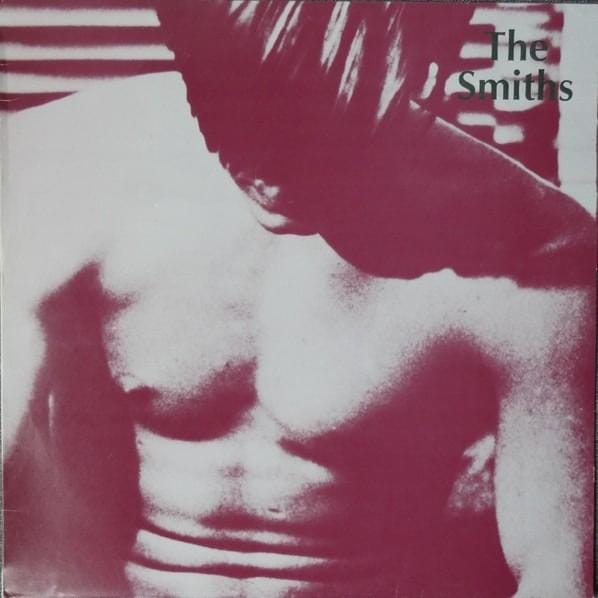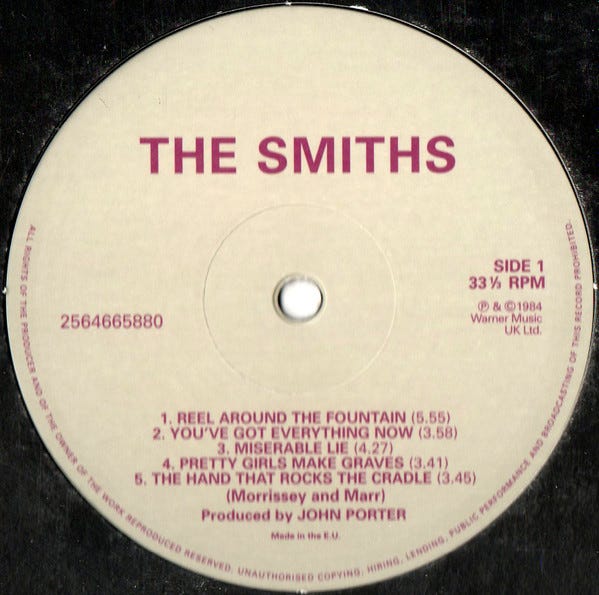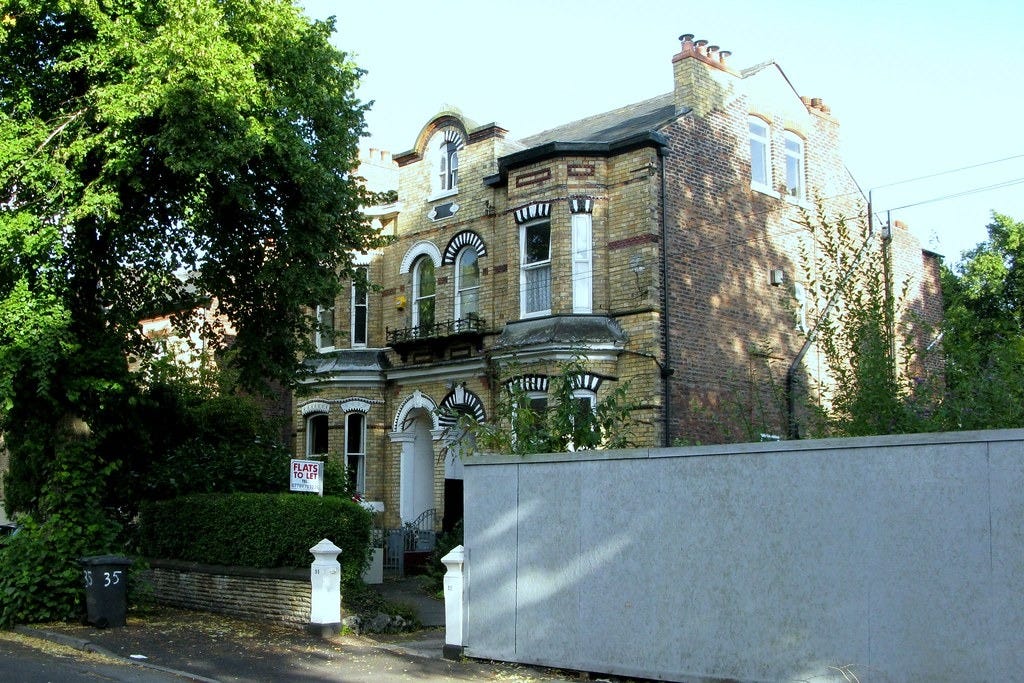"Miserable Lie"
The Bitter Fruit of Experience

“Miserable Lie” is among the first songs that Morrissey and Johnny Marr wrote together that intemperately warm summer of 1982. But it was not until late 1982 when the newly christened band began rehearsing the track at Spirit Studios1 on Tariff Street in Manchester’s Northern Quarter, that it began to take on its familiar sound.
The song was first recorded in a professional studio at the Smith's second recording session2, at Drone Studios in Chorlton, Manchester in December 1982. It was during this session that the band put together a three-song demo tape - "What Difference Does It Make?" and "Handsome Devil" were also recorded - in the hopes of securing a record contract with EMI, whose largesse had underwritten the session.
As Morrissey later reflected, “Something other than safe and dreary success was happening. EMI Records jumped in first, and paid for three recordings…3”.
However, the band’s hopes were quickly dashed, as “…they [EMI] just as quickly rejected the results4.”
The Drone Studios version of the song is said to have exceeded seven minutes, its second half markedly different from the definitive version.
The Smiths introduced the song to fans at their third gig, which was held at the Hacienda in Manchester on February 4, 1983. “Miserable Lie” was the final song of their set. They went on to perform the song 105 more times, the last being at their final concert as a band at Brixton Academy in London on December 12, 1986 where it was played as part of a one-off medley along with “London”. Listen beginning at 9:45 and then at 11:30 in the following link to hear it:
It is quite possible that the Smiths performed the song over 120 times, considering that setlist information for many of their early concerts is missing.
Just after signing with Rough Trade Records, and the subsequent release of their debut single, “Hand In Glove” (on May 13, 1983), the Smiths recorded “Miserable Lie” along with a selection of other songs that they wanted to include on their anticipated debut studio (which was not actually green-lighted by Rough Trade Records until that summer). This rather primitive recording - later named The Pablo Cuckoo tape - was made on a cassette with a single stereo microphone at a rehearsal room above Smiths’ manager Joe Moss' Crazy Face retail shop at 70, 72 Portland Street, Manchester.

Listen beginning at 34:25 in the following link to hear the Smiths’ DIY version of the song:
The song was recorded once more on May 18, 1983 for the band’s first appearance on John Peel's BBC radio program, with Roger Pusey producing the tracks. This version was broadcast on May 31, 1983. Listen to the Peel version of “Miserable Lie” in the following link:
By the summer of 1983, the Smiths were moving forward to record their debut album. Rough Trade Records selected Troy Tate5 to produce the songs, which were recorded at London's Elephant Studios in Wapping.
“Miserable Lie”, along with the other tracks recorded in what became known as the ‘Troy Tate Sessions,’ was shelved6 due to the Smiths’ dissatisfaction with Tate’s efforts. Listen to the Troy Tate version of “Miserable Lie” in the following link:
It wasn’t until Morrissey and Marr enlisted producer John Porter - who had recently produced their songs for the band’s second appearance on David Jensen’s BBC Radio One program in late August 1983 - that the definitive version of the song was finally recorded in October 1983 at Pluto Studios in Manchester city centre.
While this version made it onto their first studio album, The Smiths (released February 1984), Morrissey was not pleased with Porter’s efforts, grousing in Autobiography nearly three decades after the fact that Porter had sanitized the song’s defining traits:
“Our live firebrand Miserable Lie is choked to death and boxed in, when it had always up to this point detonated as a step-by-step incline crowned by a yowling falsetto - all of this lost in John’s production, which pulls the song back to a plod and makes the falsetto sound breathless and futile7.”
Listen to the Porter version of “Miserable Lie” here:
As bleak as it is ironic, “Miserable Lie” lays bare themes of alienation, class division, and the disillusionment of both romantic and sexual experience. Despite (or because) of it being one of the earliest songs penned by Morrissey, its words are the quintessence of his lyrical signatures: sardonic wit, emotional vulnerability, and a deep sense of social estrangement.
The opening lines (“Please stay with your own kind / And I’ll stay with mine”) signal an internalized boundary - likely class-based, or perhaps cultural - suggesting a doomed connection across a social divide.
Mocking the physical aspects of a relationship (“I’d like to see your underwear”), the narrator simultaneously laments its emotional fallout (“You have destroyed my flower-like life8,” “You have corrupt my innocent mind”). This oscillation between wit and despair embodies the track’s bleakly ironic tone, where love is described as being a “miserable lie”. The narrator, cynical and broken, finds himself trailing behind “The whole world,” stuck in a literal and metaphorical backwater - “Whalley Range9” - a location emblematic of mediocrity and failed escape.
The narrator’s repeated pleas for help in a shrill falsetto - “I need advice” - is as plaintive as it is earnest; a longing for guidance in a world that offers none. This deep, heartfelt yearning for connection that goes unanswered reveals life’s cruel lesson.
From a broader perspective, songs such as "Miserable Lie" and Morrissey’s later works while with the Smiths reveal a curiously unorthodox emotional progression. Taking "I Know It’s Over" (written in the summer of 1985, fully three years after "Miserable Lie") as an example, both tracks share a fundamental skepticism about the narrator’s capacity for real and lasting romantic fulfillment. However, while "Miserable Lie" proclaims, ‘And “love” is just a miserable lie’ - with Morrissey’s use of quotation marks around the word "love" signaling a deliberate distancing from the concept itself - "I Know It’s Over" offers a more nuanced stance. The lines “Love is natural and real / But not for such as you and I” concede love’s existence, albeit through the narrator’s exclusion from experiencing it reciprocally.
Morrissey’s disillusionment appears to have softened over time rather than hardened, evolving from a wholesale rejection of love as a “miserable lie” to a more sorrowful lament that love remains just out of reach, as expressed in “I Know It’s Over.” One can only speculate on what prompted this shift in tone, though the adulation of an ever-growing fan base may have contributed to his partial emotional renaissance.
Musically, “Miserable Lie” is something less than a fan favorite, particularly as it is almost devoid of the cohesion and melodic finesse present in most Smiths songs. Whether the band were still finding their footing musically or simply experimenting with different formulae, the song exhibits characteristics that, collectively, do not seem to work.
The track opens as a slow, melancholic ballad before undergoing a jarring shift in tone and structure that many listeners find off-putting. The second half becomes frantic and almost chaotic, driven by a sudden increase in tempo. Morrissey’s exaggerated falsetto toward the end feels more grating than expressive. Overall, the song might best be described as an underdeveloped outlier, especially when compared to the band’s more musically refined work, both at the time and in later releases.
Considering that “Miserable Lie” appeared on most of the Smiths’ live setlists, it's clear they valued its raw, if unpolished, energy. Otherwise, one has to wonder: was its repeated inclusion a deliberate artistic choice, or simply an insistence on sticking with a flawed favorite?
Founded and managed by John Breakell in 1980, Spirit began as a commercial recording studio located in Manchester’s Northern Quarter - known locally as the ‘creative quarter’). Breakell was lauded for giving unknown local bands free studio time. Spirit’s four small rehearsal rooms and single 4-track recording studio were used by Mancunian bands such as the Stone Roses, Happy Mondays, and The Fall (among others). In 1984, Spirit Studios made the transition from a commercial recording studio to an educational facility called the School of Sound Recording.
The first professional recording session took place in August 1982 at Decibelle Studios in Manchester (commonly misnamed ‘Decibel’).
Morrissey, Autobiography (New York: Penguin Classics, 2013), p. 151.
Morrissey, Autobiography (New York: Penguin Classics, 2013), p. 152.
Stéphane, Passions Just Like Mine, “Miserable Lie,” accessed September 1, 2025, http://www.passionsjustlikemine.com/songs/songs-miserablelie.htm.
At least three of the songs that the Smiths recorded with Troy Tate saw official release: -“Jeane” was released as the B-side to the 7-inch version of the Smiths’ second single, “This Charming Man” on October 31, 1983 -”Pretty Girls Make Graves” appears as a B-side to the Netherlands release of the 12-inch “Stop Me If You Think You've Heard This One Before” single in October 1987. The Tate version of this song was also released as the B-side to the UK release of the “I Started Something I Couldn't Finish” single in November 1987. -”Reel Around The Fountain” appears on the deluxe edition of the Complete compilation album, which was released in October 2011.
Morrissey, Autobiography (New York: Penguin Classics, 2013), p. 160.
Morrissey may have borrowed "Flower-like life" from Oscar Wilde. This phrase is found in Wilde’s De Profundis. Here is the full passage:
“If ever I write again, in the sense of producing artistic work, there are just two subjects on which and through which I desire to express myself: one is ‘Christ as the precursor of the romantic movement in life’: the other is ‘The artistic life considered in its relation to conduct.’ The first is, of course, intensely fascinating, for I see in Christ not merely the essentials of the supreme romantic type, but all the accidents, the wilfulnesses even, of the romantic temperament also. He was the first person who ever said to people that they should live ‘flower-like lives.’ He fixed the phrase.”
An area of Manchester two miles south-west of the city centre, it was initially known as ‘Whalley in the Range’ and was one of Manchester's first suburbs. Morrissey’s close friend Linder Sterling resided in Whalley Range at 35 Mayfield Road*. Morrissey himself lived in Whalley Range for a short time. In an interview with The Face (July 1984) Morrissey quipped that “…everyone who lives there is an unrecognised poet or a failed artist. Anyone who wishes to pursue their destiny ends up there and never gets out.”

*






This song felt like an epic in 1983, The Smiths Freebird or Stairway to Heaven, there's even a structural similarity to Stairway which reflects the lesser explored heavy rock influences on The Smiths music. This song was probably the beginning of the 'miserabilism' label attached to The Smiths and Morrissey in particular. Essentially it's a riot of a song that was a live tour de force showcasing the power of The Smiths as a musical maelstrom, a tune that dragged the audience to into it's crescendo and pulverised them. In 1983 I was evengelising for The Smiths and would play this song to the hard rockers I knew, pointing out Johnny Marr's searing guitar work, the first hints of something like a solo, an elucidating riff, heard in the spaces between Morrissey's gloomy poetics. However gloomy it may feel, it was funny to Mancunian ears, a wryness and mock scorn in the lyrics that soon became Morrissey's signifier, the Whalley Range couplet being incredibly funny if you knew the area then, a place that always seemed overcast, with young people gated in old schools of academic repute, as waylaid and washed up artists and old time drug dealers inhabited the huge Victorian houses.